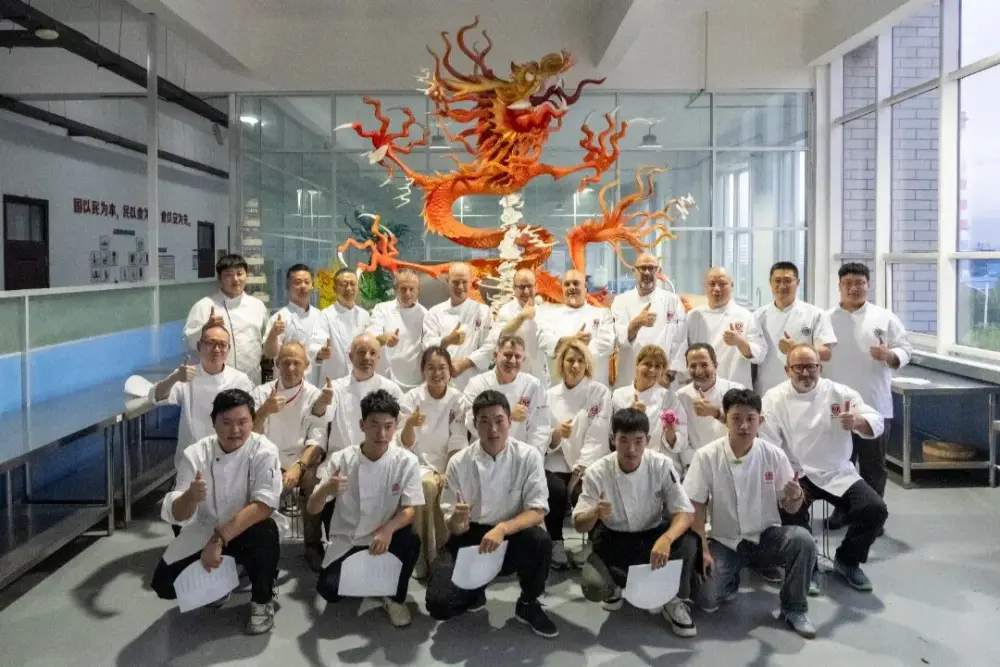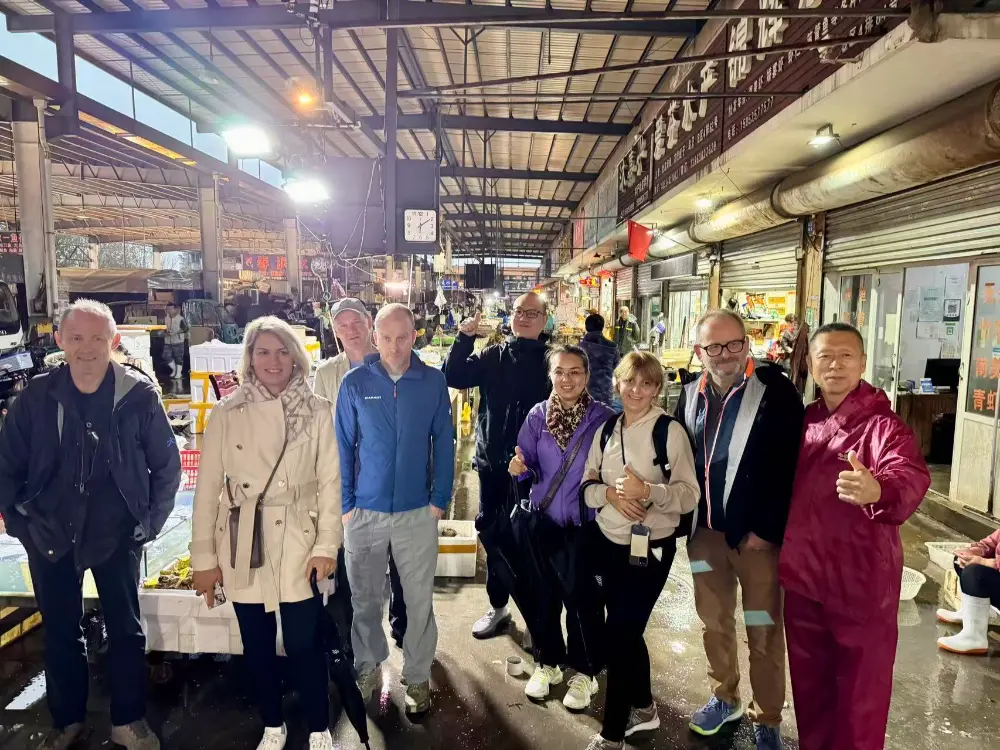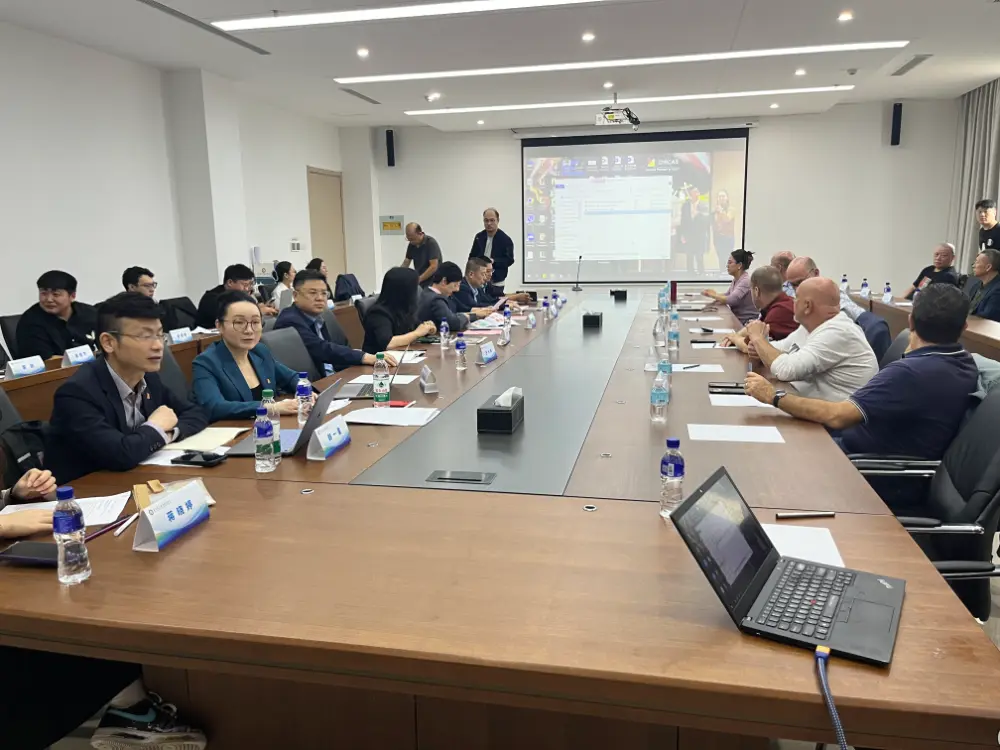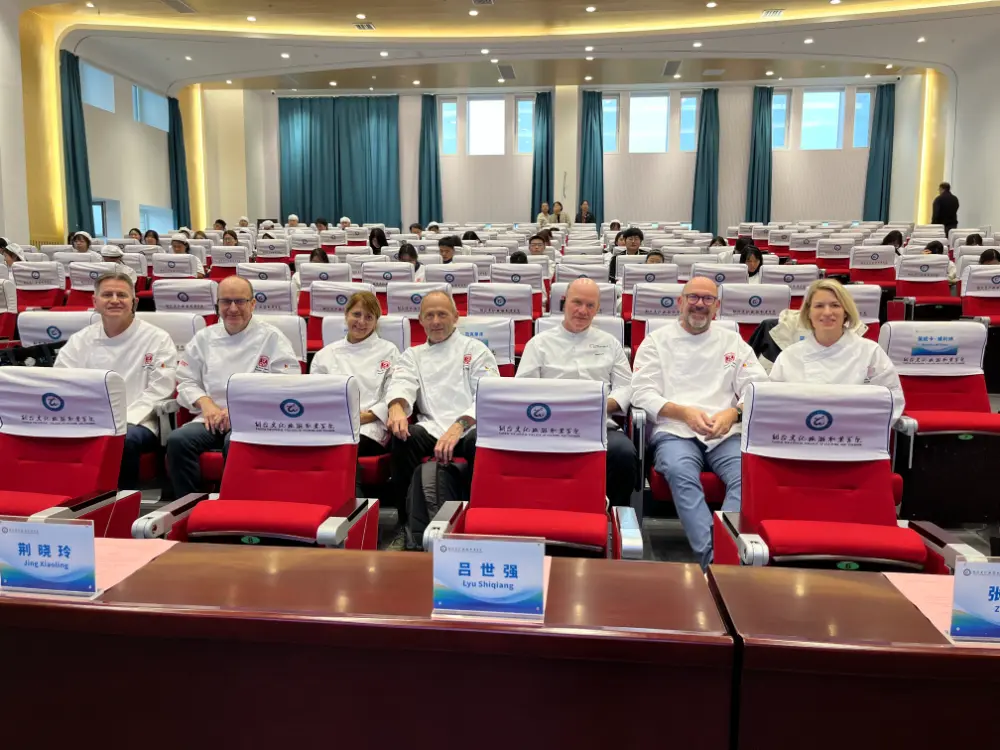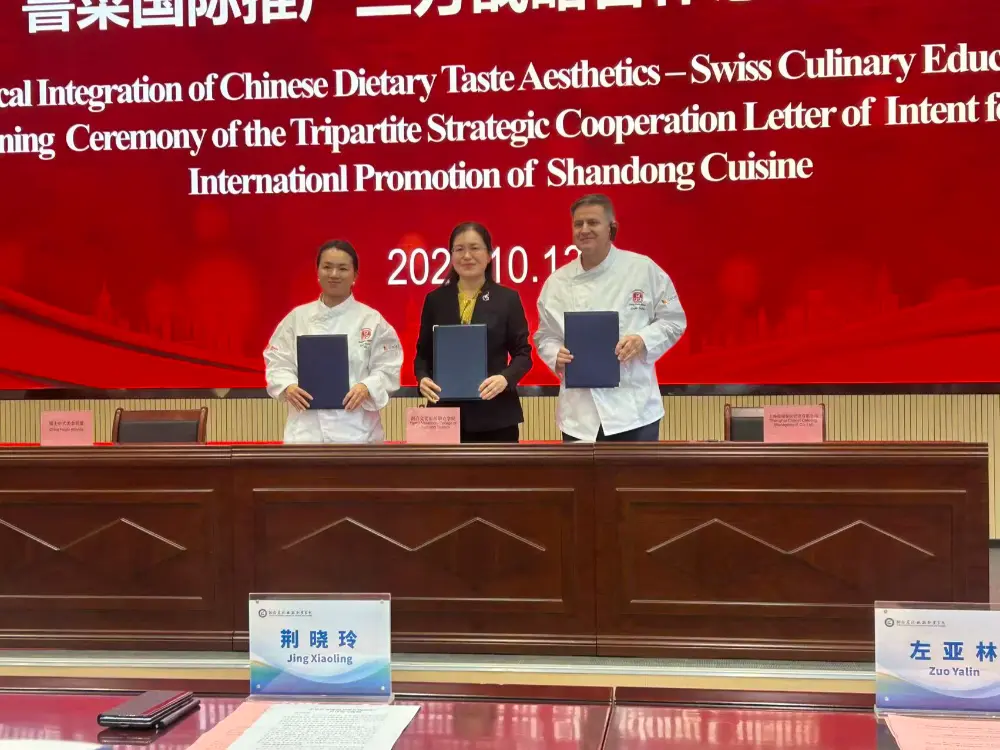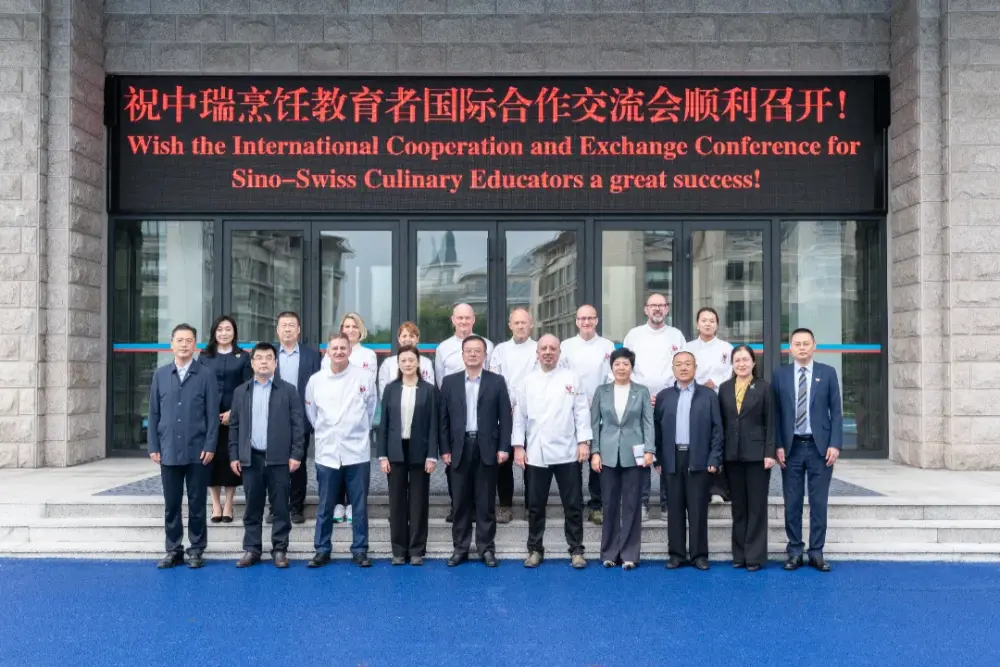Educational trip to Shanghai & Yantai October 2025
René Bachmann, 17 October 2025
Steam rises from black woks, knives clink rhythmically on the chopping boards - and ten Swiss teachers stand in the middle of a Shanghai teaching kitchen. They are not on holiday, but on an extraordinary educational trip. In ten days, from 6 to 14 October 2025, they will not only discover two cities, but also the eight major regional cuisines of China. Shanghai, the vibrant metropolis, and Yantai, the coastal city in Shandong province with around seven million inhabitants, are the locations of the Educator Training - a journey that combines cooking tradition, modern innovation and genuine hospitality.
Destination of the journey
The "Discovering Chinese Cuisine" programme was developed by the China Foods Alliance (CFA) together with Christoph Wildhaber, an exponent of Swiss vocational training in the culinary industry, and the Center of Innovation & Entrepreneurial Art Shanghai (CieCAS). The trip in October 2025 was the pilot trip for the programme - the result of over a year and a half of intensive preparation and partnership planning.
The programme is aimed specifically at teachers and educators from Switzerland. The aim is to expand culinary, didactic and cultural skills, to get to know Chinese cuisine in all its diversity and depth and to recognise possible exchange potential for chefs and students - especially with regard to solutions to the shortage of skilled workers in the catering industry.
In addition to practical knowledge, the focus is on intercultural exchange: How is food thought, taught and experienced in China? And how do educational paths, cooking philosophies and training methods differ between Switzerland and China?
Cooking exchange - idea and origin
The initiative goes back to a working group for international exchange in the cookery profession. It was set up at the beginning of 2024 by the China Foods Alliance, Christoph Wildhaber and CieCAS to counteract the shortage of skilled workers in the catering industry. The Chinese catering industry in Switzerland is particularly affected - a circumstance that also prompted the China Foods Alliance to take action.
As qualified specialists for Chinese cuisine are rare in Switzerland, the project promotes new forms of cooperation: Swiss chefs can learn the techniques and philosophy of Chinese cuisine in China, while Chinese specialists gain an insight into the Swiss dual vocational training system. This creates long-term bridges between education, craftsmanship and culture.
A delegation from 5 vocational schools
The tour group consisted of ten Swiss vocational training specialists, including vocational school teachers and training instructors from the service, cookery and meat processing sectors. The following were represented:
◆
Weinfelden Vocational and Further Education Centre (GBW)
◆
Zug Commercial and Industrial Training Centre (GIBZ)◆
Aarau Vocational School (BS Aarau)
◆
St. Gallen Vocational and Further Education Centre (GBSSG) ◆
Emme Vocational and Further Education Centre (BZ Emme)◆
Vocational Training Centre Baselland (BBZBL) / Bern Vocational College (GIBB)The group was accompanied by René Bachmann and Susan Wang from the China Foods Alliance / mybow as well as the team from CieCAS, which was responsible for local coordination and provided cooks and a translation team. This made it possible to overcome the language barriers.
The participants of the educational trip with teachers and students from Yantai College
Shanghai - Modern metropolis of the culinary arts
The starting point of the trip was Shanghai, one of the most dynamic and modern metropolises in Asia. With around 25 million inhabitants, the city is not only the economic heart of China, but also a global meeting place for culture, innovation and cuisine. Shanghai is considered the melting pot of Chinese cuisine - where tradition and avant-garde meet, from steaming cookshops in narrow alleyways to award-winning fine dining restaurants. After arriving, there was little time for sightseeing. Nevertheless, there was enough time to discover some of the city's most famous sights - from the historic old town to the impressive promenade along the Bund and the twinkling lights of the modern skyline in Pudong.
Shanghai is a vibrant metropolis that never sleeps.
Start - Insight into the 8 regional chicks
After arriving in Shanghai and a warm welcome from the CieCAS team, the first item on the agenda was an orientation to the programme and a joint welcome dinner. Over the next two days, the teachers deepened their knowledge of Chinese cuisine - from the basics and regional specialities to the wok championship, which required technique, precision and teamwork.
The main focus was on gaining an overview of China's eight major regional cuisines and recognising their characteristic differences. Under the guidance of CieCAS chefs Denny and Evo, the participants learnt how to work with the wok - an art in itself that requires strength, timing and sensitivity.
Yantai - centre of Lu cuisine
After a flight of around two hours, the group arrived in the coastal city of Yantai in Shandong Province in north-east China. The province has over 70 million inhabitants and is considered one of the oldest cultural landscapes in the country - known for its agriculture, coastal regions and deep-rooted culinary traditions.
Yantai itself, with around 7 million inhabitants, is one of China's so-called "third-tier cities" - medium-sized cities that are developing dynamically in economic and infrastructural terms, but are still lagging behind the rapid urbanisation of metropolises such as Shanghai. The participants also noticed this difference over the course of the week: less gloss, but more authenticity, friendly people, openness and direct contact with the country and its people.
The province of Shandong is considered the cradle of Lu cuisine, one of China's eight great cooking traditions. It is characterised by clear flavours, fresh seafood and precise craftsmanship - a style that is particularly cultivated in Yantai.
The region is also known for its agricultural produce: Apples, grapes, peanuts and seafood characterise the local economy. The famous apples from Yantai form a charming bridge to Switzerland - in particular to Thurgau, which is also known for its fruit growing. This parallel caused many a smile among the participants and prompted discussions about climate, education and agricultural innovation in both countries.
Yantai, the coastal city in eastern China, is also home to an authentic fish and meat market
Visit to the Yantai Vocational College of Culture and Tourism
One of the highlights of the stay in Yantai was a visit to the Yantai Vocational College of Culture and Tourism (YVCCT) - a campus with around 10,000 students specialising in gastronomy, the hotel industry and tourism.
The Swiss delegation was received with great warmth and pomp. Both sides presented their institutions and used the exchange to better understand the similarities and differences in vocational education and training. The participants gained an impressive insight into the close link between theory and practice in the Chinese vocational education and training system.
The Swiss delegation was warmly welcomed and the institutions introduced themselves to each other
The differences in infrastructure were already clearly visible on the tour of the campus. Chinese equipment with woks is fuelled by gas and the facilities cannot be compared with those in Switzerland.2 Cultures and approaches clash. Nevertheless, the Swiss teaching staff were quick to lend a hand and, together with their Chinese counterparts, conjured up tasty menus.
Under the guidance of local chefs from the college, they deepened their knowledge of Shandong cuisine, took part in a tea ceremony and tried their hand at the art of vegetable carving. At an education forum, Chinese and Swiss educators exchanged views on teaching methods, skills development and career prospects - a dialogue that revealed cultural differences, but above all shared values: passion, precision and respect for food.
The dishes cooked by the Swiss teachers together with their Chinese counterparts are proudly presented.
Sino Swiss Memorandum of understanding
The event concluded with a formal ceremony at which a Memorandum of Understanding (MoU) was signed between Yantai College, CieCAS and the China Foods Alliance. The signing was symbolically sealed with the unveiling of a golden plaque - a visible sign of future cooperation within the framework of the Sino-Swiss Exchange based on Culinary Culture. Local political representatives also attended the ceremony and emphasised the importance of this agreement for the college and the entire Yantai region.
The visit ended with a gala dinner in the grand ballroom, where culinary bridges were built between Switzerland and China: The plaits, rösti, pork kidney, risotto and minestrone prepared by the Swiss delegation were combined with authentic Shandong menus. The evening was accompanied by performances by the students - including a lion dance, traditional Chinese dances and an impressive kung fu demonstration - an atmospheric end to an unforgettable week in Yantai.
The signing ceremony was initiated on a grand scale.
🌐 More on the Memorendum of Understanding
Return to Shanghai
After an intensive week in Yantai, the Swiss delegation flew back to Shanghai. The last day of the programme was dedicated to the conclusion: the participants were honoured for their commitment and intercultural exchange at a certificate ceremony at the CieCAS training centre. In a short reflection round, everyone looked back on ten days full of impressions, culinary discoveries and encounters. The celebratory finale was a joint closing dinner, which once again emphasised what this trip was all about - learning, exchange and genuine hospitality.
10 intense days and many new impressions
After ten intensive days in Shanghai and Yantai, the participants returned to Switzerland with many impressions, new insights and valuable encounters. The trip showed how food, education and culture can build bridges - between people, countries and learning cultures. It also showed that Chinese cuisine is extremely varied - but sometimes very exotic and not quite commonplace for us Swiss. But all the participants put up a good fight and ate something that you probably wouldn't eat in Switzerland.
What began as a pilot project became a lively exchange on vocational training and culinary identity.
With this programme, the China Foods Alliance and CieCAS have laid an important foundation for bringing even more specialists from Switzerland and China together in the future - in the spirit of the Sino-Swiss Culinary Exchange.
And last but not least, new friendships were forged.
About the China Foods Alliance
The China Foods Alliance®, also known as "Pin", promotes and preserves authentic Chinese culinary traditions, strengthens cooperation between Chinese restaurants and local businesses, improves the quality and visibility of Chinese cuisine and promotes cultural exchange between China and Switzerland. It works with partners from education, catering and business to make authentic Chinese cuisine visible and tangible.
As the publisher of Switzerland's first official China Foods Guide, the Alliance organises culinary events in Chinese restaurants as well as team and customer events where participants can immerse themselves in Chinese cuisine and culture. In addition, the China Foods Alliance organises educational and adventure trips to China - both for professional educators and teachers as well as for foodies who want to experience Chinese food culture first-hand.
TO CIECAS
The Center for Innovative & Entrepreneurial Culinary Arts + Services (CieCAS) in Shanghai is a training and consulting centre based on the Swiss model of dual vocational training. As a partner of the Shanghai CNST Institute of Continuing Education, CieCAS offers practical programmes for professionals in the catering and hotel industry.
The training courses are recognised by the Swiss Chefs Association and are run in collaboration with Global Swiss Learning. In cooperation with Shinho Food Services, CieCAS promotes innovation and product development in the Chinese catering industry. With the guiding principle "Learn and apply what you have learnt immediately", CieCAS combines theory and practice - thus shaping the future of culinary education in China.
